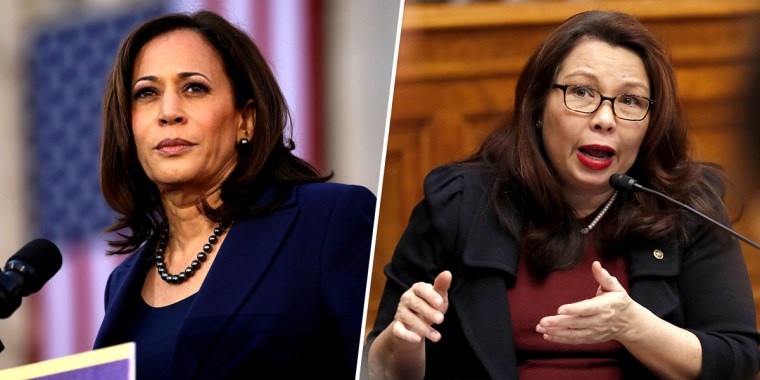WASHINGTON — As Joe Biden gets closer to announcing his vice presidential pick, pressure has intensified to pick a woman of color. In the aftermath of the nationwide Black Lives Matter protests, most of the attention has been focused on a handful of Black women.
Two of those on his short list stand out for a different reason: Both are part of the Asian American community. Sen. Tammy Duckworth of Illinois is Thai American, and Sen. Kamala Harris of California, who is Black, is also Indian American.
Both parties have largely overlooked the impact of the Asian American vote, but it could be significant in 2020.
Battlegrounds states like Michigan, Texas and even Arizona — all states where Biden and President Donald Trump are within single digits in recent polling — have booming Asian American populations. From 2012 to 2018, for example, the population of eligible voters in Arizona grew by 13 percent — but when you look at Asian American voters, the growth was 47 percent.
Christine Chen, the executive director of APIAVote, said that Asian American voter turnout will "definitely" affect both Senate races and the presidential race in November — and that the involvement and engagement of Asian American voters in certain swing House races is already making a difference.
One of the swing House races in which Asian American turnout could spike is in Texas' 22nd District, which includes the suburbs of Houston. It's reliably red, but with an Asian American population of 19 percent, Democratic candidate Sri Preston Kulkarni, who is South Asian American, is hoping to flip it blue in November.
But when it comes to the presidential race, the relative silence in public discussions about the significance of having two Asian American women under consideration for vice president contributes to an overall sense of "invisibility" among Asian Americans, especially when it comes to politics, advocates say.
"Their Asian heritage is invisible in most conversations" happening around Biden's pick, said Sayu Bhojwani, president of New American Leaders, an organization that works to get immigrants running for office.
Download the NBC News app for breaking news and politics
Asian American voters have historically turned out to vote at lower rates than other racial groups. But both Democrats and Republicans have histories of failing to engage with Asian American voters, even though they are the fastest-growing minority group in the country.
In a poll from AAPI Data in 2018, roughly 50 percent of Asian Americans said they had not been contacted by the Democratic Party; the number rises closer to 60 percent for being contacted by Republicans.
It's a community under a wide umbrella of cultures, languages and political beliefs, so voter turnout would benefit both parties. The Vietnamese American community has a longer history of voting Republican and leans more red compared to Indian, Chinese and Japanese Americans, for instance.
"Parties and candidates need to not take our communities for granted and invest in learning about our political histories, about our specific cultural patterns," Bhojwani said. "Asian Americans care about bread-and-butter issues just like most other voters. It's really about how much are we going to invest in the specific outreach and connection that's required."
That outreach is deeply important, given that two-thirds of Asian Americans are immigrants — there's no established history of voting in U.S. elections in their families.
"If your parents vote, the chances of you becoming a voter is significantly higher. So imagine if your parents are immigrants and they can't pass that down to you. There's a language barrier. There's unfamiliarity with being engaged and getting involved in the democratic process. ... I think that plays a part in the invisibility role," said Jennifer Baik, a communications and policy associate at APIAVote.
Breaking the cycle of political invisibility also comes down to the power of Asian Americans running for office themselves and how their presence on the political stage turns out more people in their community in terms of votes and fundraising.
Some of those candidates are getting financial support from the party, as well. In the Texas 22nd District race, the Democratic Congressional Campaign Committee recently invested in digital ads for Kulkarni — running them in Chinese and Hindi to break down the language barrier for many Asian American voters.
"When Asian Americans run for office, they actually do increase the AAPI participation," Chen said, using the common initialism for Asian American and Pacific Islanders. "What we have seen is that, as there's been a growth of AAPIs running for office across the country, we've also seen a growth of AAPI participation."
That's exactly why some Asian American voters say having an AAPI woman on the Democratic presidential ticket able to relate to their experiences and identities would be so significant — and have the potential to impact key states up for grabs in 2020.
Neil Makhija, the director of Impact, an organization to get Indian Americans to run for office, recently wrote an op-ed about why he supports Harris for Biden's vice presidential pick.
"Even knowing her story will inspire people" to vote, Makhija said. "Many of our parents are immigrants. We share that experience."
